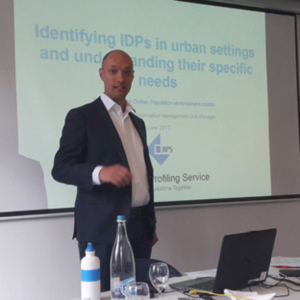
 For this summer’s ‘Protection of the Civilian Population’ course, ICRC invited JIPS to contribute by leading a session on profiling internal displacement situations in urban settings.
For this summer’s ‘Protection of the Civilian Population’ course, ICRC invited JIPS to contribute by leading a session on profiling internal displacement situations in urban settings.
Building on our experiences with urban profiling exercises from Honduras and Hargeisa, Somalia Assanke Koedam, JIPS’ Information Management Manager, discussed with the 30 ICRC counterparts from field operations around the world the usefulness of profiling in urban settings as well as its limitations in humanitarian emergencies.
The ICRC’s recently released publications, including the ‘When War Moves to Cities: Protection of Civilians in Urban Areas’, ‘Translating the Kampala Convention into Practice’ and ‘Handbook on Data Protection in Humanitarian Action’ underline both the prioritisation of urban response in their activities, and the value of data for protection work. Increasingly ICRC is also re-instating their focus on internal displacement, working to address specific protection issues that impact IDPs.
As for other humanitarian and development partners, addressing internal displacement in urban settings raises particular challenges. IDPs are not easily identifiable as they live mixed together with neighbouring population groups. Issues such as access to public services, the relationship with the host community, and housing also take on additional importance.
So how can we locate IDPs in urban areas to better understand the specific challenges and protection risks they face? Building on JIPS’ experience, Assanke Koedam elaborated on different “mapping” techniques and practices that could help ICRC colleagues to undertake this work. For example in Hargeisa, Somalia partners first had to establish contact with community leaders to learn about the places where displaced populations were settled. More challenging for those residing outside of settlements in lesser-known locations, this “mapping exercise” served as the basis for a comprehensive profiling exercise through enumeration and a household survey.
In Honduras, where little was known about the magnitude and characteristics of forced displacement, a qualitative mapping process (through visits, interviews and focus groups discussions) was used to identify the communities and neighbourhoods with the highest concentration of IDPs to be targeted for the survey. Here the deep sensitivity of the topic and limited willingness for people to be identified as being displaced made the mapping process particularly difficult to conduct. The resulting profiling exercise, however, helped to give visibility to the internal displacement situation in the country and to form an evidence-base for the development of national policy.
Building on a collaborative process and using mixed methods approaches adapted to the specific context, profiling lends itself particularly well to achieve a sound evidence-base for joint responses in urban settings and to enhance the protection of IDPs in a protection-sensitive manner.
This becomes all the more important in situations of long-term displacement, where there are typically fewer resources available to support humanitarian and development responses. Thus collaboration between municipal authorities, humanitarian and development actors, and others is key.
At JIPS, sharing experiences and continuously improving our practices is at the core of our approach. We are excited about participation of an ICRC colleague in this week’s Profiling Coordination Training, and aim to share our expertise, knowledge and tools through relevant partner trainings when and where it is required – so be in touch!